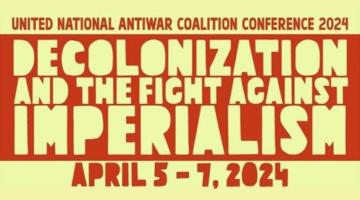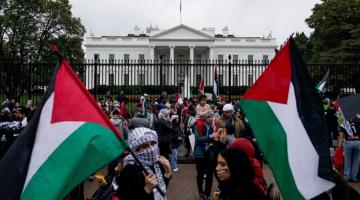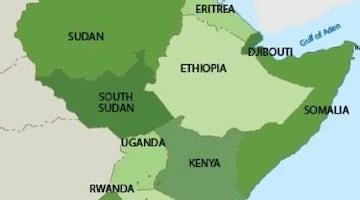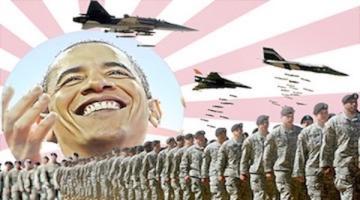“I have come to you tonite not just for the stoppage
of nuclear proliferation, nuclear
plants, nuclear bombs, nuclear
waste, but to stop the proliferation
of nuclear minds….”
One of the largest political demonstrations in U.S. history occurred on July 12, 1982. It was a peace – and anti-nuclear – rally in New York City held to coincide with a United Nations special session on nuclear disarmament. In the preceding years, there had been protests over the United States against the accelerating arms race between the U.S. and the Soviet Union, especially as the Ronald Reagan administration provoked the Soviet Union by planning to locate short-range nuclear missiles in Europe. In response, Peace Rallies for Nuclear Disarmament were staged across the US. 30,000 people attended a rally in Denver; 100,000 people turned up in Pasadena, California. But the July 12, 1982 New York City rally was by far the largest: close to one million people flooded Central Park, calling for the abolition of nuclear weapons, an end to the arms race, and the shifting of military budgets to social needs.
Artists and other cultural practitioners were recruited to raise public consciousness around the dangers of nuclear war, including singers Joan Baez and Chaka Khan, and poet Sonia Sanchez. Many activist groups linked the call for nuclear disarmament with other social justice issues such as poverty and racism, as well as U.S. imperialism in Latin America.
While results of the June 12 rally are difficult to ascertain, the ultimate legacy can be said to be the U.S and Soviet Union signing, five years later, the Intermediate-Range Nuclear Forces (INF) Treaty, the first time in history that the superpowers had agreed to reduce their nuclear stockpiles, destroy an entire category of nuclear weapons, and open up their countries for inspections to ensure compliance.
However, after the end of the Cold War and the fall of the Soviet Union, the movement against nuclear disarmament would lose its power. After picking through the carcass of the Soviet Union, the West, through the North Atlantic Treaty Organization (NATO), assumed that the emergent Russia was weak and would remain so. Over the past 30 years, through NATO, the U.S. has surrounded Russia with its bases, bases stockpiled with nuclear arms. In 2019, Donald Trump removed the U.S. from the INF treaty. Russia soon followed. It should be stated, however, that Trump was adopting the stance of the administration of Barack Obama who saw in China, a country that was not bound by the INF treaty, an increasing nuclear threat
The U.S. and NATO have used the proxy war in Ukraine to drastically expand their armaments. European countries are working hard to jointly develop long range cruise missiles and the U.S. is working on longer range missiles to be placed in its bases in Germany. Russia meanwhile, has resumed production of the missiles originally prohibited by the INF treaty. All of this adds to more than 13,000 nuclear warheads currently stockpiled by the U.S., Russia, China, Israel, Pakistan, India, Britain, France, and North Korea. Meanwhile, U.S. and European officials openly and recklessly discuss the use of nuclear weapons. They have been publicly asserting their readiness for nuclear war. We are, in effect, in an even bigger arms race than the days of the Cold War, and if the belligerent and provocative statements by U.S. officials and their EU and NATO minions are any indication, we may well be in a hot war sooner than later.
The great African American poet Sonia Sanchez attended the June 12, 1982 peace rally in New York City. After the rally, she wrote the poem, “Reflections after the June 12th March of Disarmament,” published in the collection Homegirls & Handgrenades in 1984. In the poem, Sanchez asked us to not only to call for nuclear disarmament, but to understand the long history of the violence of the “inhumanitarians” that encourages war, destruction, and death:
…
I have come to you tonite because there are
inhumanitarians in the world. they are not
new. they are old. they go back into history.
they were called explorers, soldiers, mercenaries,
imperialists, missionaries, adventurers
...
Sanchez called for the world to find sanity, for a world where the elite “give up their need for excess wealth and learn how to share the world’s resources.” She asks us to “learn to suckle life not/bombs” – and to fight for peace.
We are living in dangerous times. We know the western elite is willing to destroy the entire world rather than give up its power; the West’s violent spasms of death could easily lead us to nuclear war, and nuclear annihilation. At this moment of extreme violence, with her call to “deliver the earth again into the hands/of the humanitarians…,” and her charge that two hundred years of Black freedom struggles were not in vain, Sanchez’s words provide a glimmer of hope in this age of despair. We reprint Sonia Sanchez’ “Reflections after the June 12th March of Disarmament” below.
Reflections after the June 12th March of Disarmament
Sonia Sanchez
I have come to you tonite out of the depths
of slavery
from white hands peeling black skins over
america;
I have come out to you from reconstruction eyes
that closed on black humanity
that reduced black hope to the dark
huts of america;
I have come to you from the lynching years,
the exploitation of black men and women by
a country that allowed the swinging of
strange fruits from southern trees;
I have come to you tonite thru the
delaney years, the du bois years, the
b.t. washington years, the robeson
years, the garvey years, the
depression years, the you can't eat
or sit or live just die here years,
the civil rights years, the black power
years, the black nationalist years, the
affirmative action years, the liberal
years, the neo-conservative years;
I have come to say that those years
were not in vain; the ghosts of our
ancestors searching this american dust for
rest were not in vain, black women
walking their lives in clots were not
in vain, the years walked
sideways in a foresaken land were not
in vain;
I have come to you tonite as an equal,
as a comrade, as a black woman
walking down a corridor of tears,
looking neither to the left or the right,
pulling my history with bruised
heels,
beckoning to the illusion of America
daring you to look me in the eyes to
see these faces, the exploitation of a
people because of skin pigmentation;
I have come to you tonite because no people
have been asked to be modern day people
with the history of slavery, and still
we walk, and still we talk, and
still we plan, and still we hope and
still we sing;
I have come to you tonite because there are
inhumanitarians in the world. they are not
new. they are old. they go back into history.
they were called explorers, soldiers, mercenaries,
imperialists, missionaries, adventurers,
but they looked at the world for what
it would give up to them and they violated
the land and the people, they looked
at the land and sectioned it up for
private ownership, they looked at the
people and decided how to manipulate
them thru fear and ignorance, they looked
at the gold and began to hoard and
worship it;
I have come to you because it is time
for us all to purge capitalism from
our dreams, to purge materialism
from our eyes, from the planet earth
to deliver the earth again into the hands
of the humanitarians;
I have come to you tonite not just for the stoppage
of nuclear proliferation, nuclear
plants, nuclear bombs, nuclear
waste, but to stop the proliferation
of nuclear minds, of nuclear generals
of nuclear presidents, of nuclear scientists,
who spread human and nuclear waste
over the world;
I come to you because the world needs to be
saved for the future generations who must
return the earth to peace, who will not
be startled by a man's/woman's skin color;
I come to you because the world needs sanity
now, needs men and women who will
not work to produce nuclear weapons,
who will give up their need for excess
wealth and learn how to share the
world's resources, who will never
again as scientists invent again just
for the sake of inventing;
I come to you because we need to turn our
eyes to the beauty of this planet, to the
bright green laughter of trees, to the beautiful
human animals waiting to smile their unprostituted smiles;
I have come to you to talk about our inexperience
at living as human beings, thru death marches and cam
thru middle passages and slavery
and thundering countries raining hungry faces;
I am here to move against
leaving our shadows implanted on the
earth while our bodies disintegrate in
nuclear lightning;
I am here between the voices of our ancestors
and the noise of the planet,
between the surprise of death and life;
I am here because I shall not give the
earth up to non-dreamers and earth molesters;
I am here to say to you:
my body is full of veins
like the bombs waiting to burst
with blood.
we must learn to suckle life not
bombs and rhetoric
rising up in redwhiteandblue patriotism;
I am here. and my breath/our breaths
must thunder across this land
arousing new breaths. new life.
new people, who will live in peace
and honor.
Sonia Sanchez, “Reflections after the June 12th March of Disarmament,” from Homegirls and Handgrenades (New York: Thunder’s Mouth Press, 1984)



















